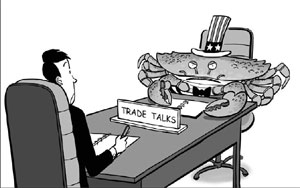Protectionism no cure for workers wary of China
By G. Dennis O'Brien (China Daily)Updated: 2007-04-11 14:14
In the US, where the economy has been booming, the jobless rate has dropped by over 26 percent in the last three years. Productivity gains have been spectacular.
For over a decade the United States has experienced more than a doubling of its normal productivity increase, averaging more than 2.6 percent each year. But these gains have not been passed on to labor and real wages have been stagnant. The share of compensation as a percentage of GDP has actually dropped from 56 percent to less than 54 percent.
As a result, middle-class Americans find themselves gripped by a gnawing sense that they are just barely hanging onto their economic status in an increasingly unsustainable economic environment. Their anxieties are for the moment kept in check by the thriving US economy. But if the US economy falters so that unemployment goes up and real wages fall, their frustration may erupt.
Economists tell us that falling real wages are a cyclical phenomenon, and that real wages have already started to rise. If so, improvements in labor market conditions may be so recent that real wages have not had time to catch up.
It certainly is important to distinguish between the temporary effects of a
business cycle and the structural relationship between trends in productivity
and real wages. 
In the last dozen years, actions that have been taken to increase productivity have largely been dominated by simply cutting costs. And since labor is the largest part of business production costs, it is the easiest to cut. Therefore it is not surprising that a decade after the revival of US productivity, real wages are still stagnant.
This fact has now put pressure on the US political system to reply with protectionist rhetoric. This is coming from both sides of the political spectrum liberal Democrats and conservative Republicans.
American workers may or may not be disenfranchised economically but they are certainly not disenfranchised politically. If they feel economically cornered they may react irrationally and seek short term emotional solutions that are not really in their best long-term economic interest. And China will become the target of choice.
While 58 percent of Americans may be in favor of globalization, there is no doubt that China is seen as an unfair trading partner by the average worker.
Americans believe that if China were to float its currency on the free market, somehow magically the outflow of US jobs would cease. US workers sees China's participation in the World Trade Organization in the worst light possible. Right or wrong, they view the Chinese connection to the free market system as somewhat cynical and manipulative.
US middle-class workers have little sympathy for the demands for growth and job creation that have been placed on the Chinese economy.
They do not seem to understand how significant and crucial export-driven growth has been to China's shift to a free market economy. Nor do they appreciate the fact that the spectacular Chinese economic growth has lifted the US standard of living through lower prices.
What the US worker also fails to recognize is that because China's real wages are less than 5 percent of what they are in the States, that even if the exchange rate were to double, virtually no jobs would flow back to the United States.
They would simply shift to other developing countries. Productivity gains would slow down, prices would rise, interest rates would go up and the US standard of living would fall.
Protectionism satisfies the user only for a very short period, if at all. Its use will - with almost geometric certainty - create economic distortions both within the society that puts up the barriers and in the world markets that suffer from it.
Unfortunately in the short run protectionism may be very appealing politically - consequences be damned. It appears to be a response to the anguished frustration of the middle-class American.
It plays well to the devastated manufacturing communities of America's Midwest, to the union worker on the West Coast and to the conservative fundamentalist in the Southeast. As former US President Richard Nixon used to say, "It plays well in Peoria." And that's what makes it a dangerous game.
To keep this force at bay, and to keep it from disrupting China's economic growth, China may have to increase its own self-imposed economic disciplines, reform some of the policies which may have created market place distortions, and move away from its reliance on export-led growth. China will have to begin to rely more heavily on its own internal markets to fuel its growth and ensure its sustainability.
G. Dennis O'Brien is an economist and a merchant banker based in Wilmington Delaware, USA
(China Daily 04/11/2007 page11)
 | 1 | 2 |
(For more biz stories, please visit Industry Updates)